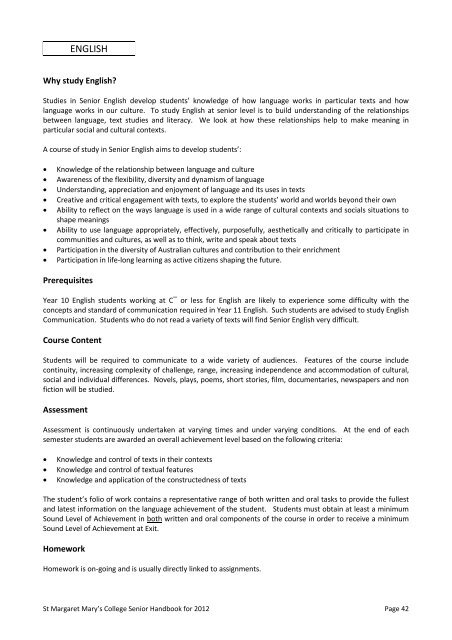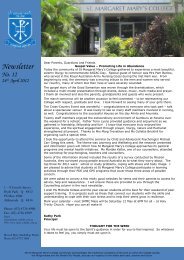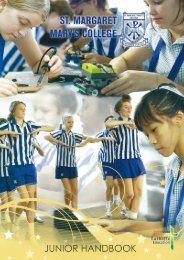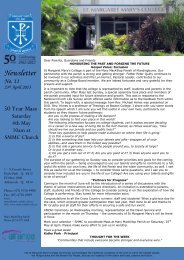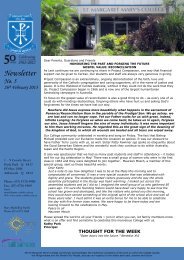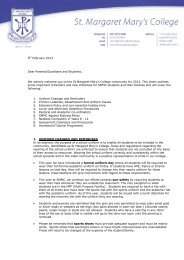SENIOR HANDBOOK for 2012
PRINCIPAL'S MESSAGE - St Margaret Mary's College
PRINCIPAL'S MESSAGE - St Margaret Mary's College
- No tags were found...
Create successful ePaper yourself
Turn your PDF publications into a flip-book with our unique Google optimized e-Paper software.
ENGLISH<br />
Why study English?<br />
Studies in Senior English develop students’ knowledge of how language works in particular texts and how<br />
language works in our culture. To study English at senior level is to build understanding of the relationships<br />
between language, text studies and literacy. We look at how these relationships help to make meaning in<br />
particular social and cultural contexts.<br />
A course of study in Senior English aims to develop students’:<br />
<br />
<br />
<br />
<br />
<br />
<br />
<br />
<br />
Knowledge of the relationship between language and culture<br />
Awareness of the flexibility, diversity and dynamism of language<br />
Understanding, appreciation and enjoyment of language and its uses in texts<br />
Creative and critical engagement with texts, to explore the students’ world and worlds beyond their own<br />
Ability to reflect on the ways language is used in a wide range of cultural contexts and socials situations to<br />
shape meanings<br />
Ability to use language appropriately, effectively, purposefully, aesthetically and critically to participate in<br />
communities and cultures, as well as to think, write and speak about texts<br />
Participation in the diversity of Australian cultures and contribution to their enrichment<br />
Participation in life-long learning as active citizens shaping the future.<br />
Prerequisites<br />
Year 10 English students working at C‾ or less <strong>for</strong> English are likely to experience some difficulty with the<br />
concepts and standard of communication required in Year 11 English. Such students are advised to study English<br />
Communication. Students who do not read a variety of texts will find Senior English very difficult.<br />
Course Content<br />
Students will be required to communicate to a wide variety of audiences. Features of the course include<br />
continuity, increasing complexity of challenge, range, increasing independence and accommodation of cultural,<br />
social and individual differences. Novels, plays, poems, short stories, film, documentaries, newspapers and non<br />
fiction will be studied.<br />
Assessment<br />
Assessment is continuously undertaken at varying times and under varying conditions. At the end of each<br />
semester students are awarded an overall achievement level based on the following criteria:<br />
<br />
<br />
<br />
Knowledge and control of texts in their contexts<br />
Knowledge and control of textual features<br />
Knowledge and application of the constructedness of texts<br />
The student’s folio of work contains a representative range of both written and oral tasks to provide the fullest<br />
and latest in<strong>for</strong>mation on the language achievement of the student. Students must obtain at least a minimum<br />
Sound Level of Achievement in both written and oral components of the course in order to receive a minimum<br />
Sound Level of Achievement at Exit.<br />
Homework<br />
Homework is on-going and is usually directly linked to assignments.<br />
St Margaret Mary’s College Senior Handbook <strong>for</strong> <strong>2012</strong> Page 42


